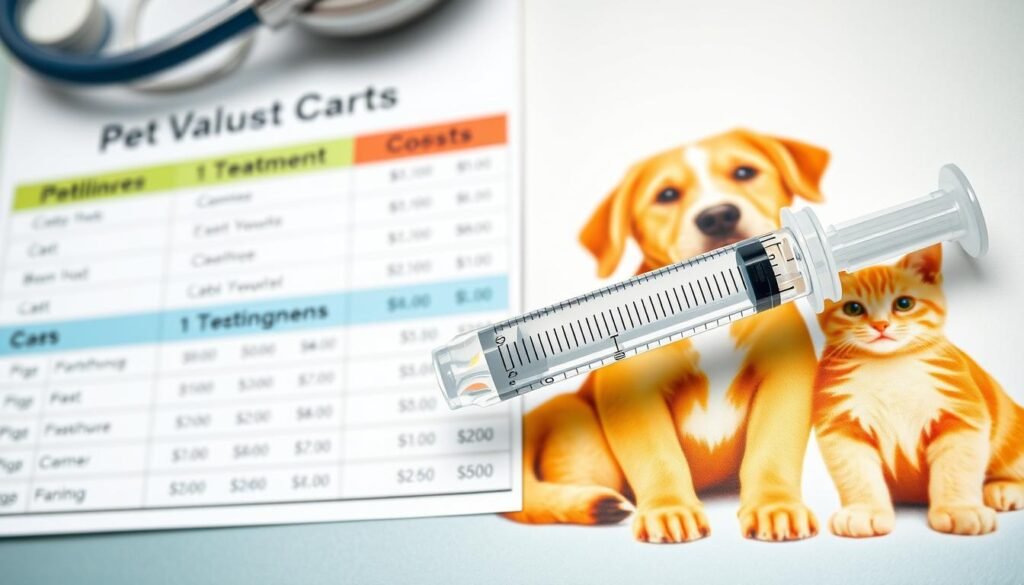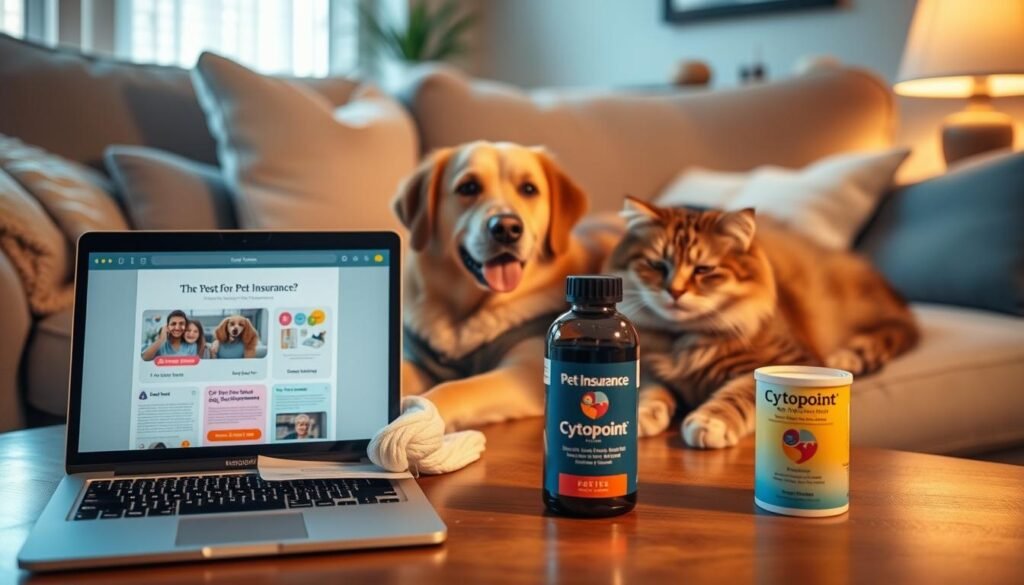Did you know the average cost of Cytopoint injections for dogs is between $1,200 and $2,4001? This shows how vital it is to have pet insurance that covers this allergy medication. As a pet owner, keeping your furry friend healthy and managing costs is key.
Finding pet insurance that covers Cytopoint is essential for your pet’s health and your wallet. This article will explore Cytopoint, its benefits, side effects, costs, and how insurance can help. You’ll learn how to choose the right insurance for your pet.
Key Takeaways
- Cytopoint is an injectable medication that can effectively manage allergic skin conditions in dogs
- The average annual cost of Cytopoint injections ranges from $1,200 to $2,400
- Pet insurance policies often cover Cytopoint and other prescribed medications, providing financial relief
- Customizing your pet insurance plan allows you to tailor coverage to your specific needs and budget
- Understanding the details of pet insurance coverage is essential to ensure your pet receives the care they deserve
What is Cytopoint and How Does it Work?
Cytopoint is a new injectable medicine for dogs with allergic skin issues. It helps stop itching and discomfort. It works by blocking a chemical called IL-31 that sends itch signals to the brain2. Your dog’s weight decides the dose, given as a shot every 4-8 weeks32.
The main part of Cytopoint, lokivetmab, stops IL-31 from sending itch signals. This gives dogs relief from scratching, licking, and chewing2. It’s a new way to treat allergies in dogs, different from old treatments like antihistamines and steroids.
| Dog Size | Cost per Cytopoint Injection | Cost for 3 Injections | Cost for 12 Injections (Annual) |
|---|---|---|---|
| Small | $60 | $180 | $720 |
| Medium | $100 | $300 | $1,200 |
| Large | $150 | $450 | $1,800 |
| Giant | $200 | $600 | $2,400 |
The price of Cytopoint shots changes with your dog’s size and weight. Smaller dogs cost less per shot4. It’s also cheaper over time than old allergy meds, which might not work as well or have side effects4.
Cytopoint is a great tool for dogs with allergies. It offers a unique and effective way to stop itching and scratching. Knowing how it works and its cost helps pet owners choose the best treatment for their dogs.
Potential Side Effects of Cytopoint Injections
Cytopoint is usually safe for dogs, but owners should know about possible side effects. Cytopoint treatments have shown a success rate of 87.8% in patients with allergic dermatitis.5 Some dogs might feel pain, limp, or get tired after the shot. They could also vomit, have diarrhea, or lose their appetite56.
Severe reactions are rare but can happen. Dogs might feel very tired, weak, or have trouble breathing. They could also get facial swelling or hives if they’re allergic56. Vets usually watch the dog closely after the first shot to catch any problems5.
Potential side effects of Cytopoint injections include injection site irritation, vomiting, diarrhea, lethargy, and allergic reactions.5 Cytopoint injections for dogs cost between $50 to $200 per shot, with annual treatment costing $350 to $2,600 total depending on injection frequency and dog size.6 Cytopoint has been shown to be 73-88% effective in relieving itchiness in dogs due to allergies based on clinical studies.7
Talking to your vet about any worries about Cytopoint’s side effects is key. This ensures your pet gets the best care.

Long-term Use of Cytopoint for Dogs
Cytopoint is a new way to treat dogs with allergies. It doesn’t just hide the symptoms like old treatments do. It actually stops the itch signals from reaching the brain8.
For dogs with long-term allergies, Cytopoint can be a lasting fix. Vets usually check in every 4 to 8 weeks after the first shot9. This makes sure your dog gets the care they need without too many trips to the vet.
Tailoring Cytopoint Treatment
The amount of time between shots can change based on how bad your dog’s allergies are. Some breeds, like West Highland Terriers and Labrador Retrievers, might need more shots9. Their vet will decide the best plan for them.
A study showed that 65% of dogs felt better after the first shot. More shots made 85% and 93% feel better10. If the first shot didn’t work, 79% got better with more shots10. This means vets can adjust the treatment to fit your dog’s needs for long-term relief.

Cytopoint might not cure allergies forever, but it makes a big difference. It stops the itch from causing more problems like infections98.
“Cytopoint is a game-changer for dogs with chronic allergies. It provides long-term relief without the side effects of traditional treatments.”
Always talk to your vet before starting Cytopoint. It’s effective and can be adjusted to fit your dog’s needs9108.
Average Cost of Cytopoint Injections
The cost of Cytopoint injections varies based on your dog’s size and weight. Reports show the average yearly cost is between $1,200 and $2,40011. This is because bigger dogs need more of the treatment, making each shot more expensive.
A single Cytopoint shot can cost between $50 to $200. Some pet insurance plans may cover part or all of this cost11. Also, the first two shots need a vet’s visit, adding to the overall cost12.
The price of Cytopoint can also change based on where you live. For example, in Adelaide, Australia, the cost for dogs weighing 3kg to 40kg is between $111 and $15012.
| Metric | Value |
|---|---|
| Average Annual Cost of Cytopoint Injections | $1,200 – $2,40011 |
| Average Cost per Single Cytopoint Injection | $50 – $20011 |
| Cytopoint Injection Costs in Adelaide, Australia | $111 – $150 for dogs 3kg to 40kg12 |
Thinking about Cytopoint for your pet’s pet fertility treatments or pet newborn care? It’s key to know the costs and check if insurance can help with the bills.

Pet Insurance that Covers Cytopoint
Most pet insurance policies cover prescriptions like Cytopoint for dogs13. This is great news for pet owners dealing with their pets’ allergies. It helps manage the cost of ongoing Cytopoint treatments13. Having insurance that covers Cytopoint means your pet gets the care they need without breaking the bank.
Dogs and cats with allergies may itch, scratch, and chew their paws13. They might also have red skin, sneeze, and have watery eyes13. To help, owners should bathe them with special shampoo, clean their paws, and vacuum often13. But for serious allergies, Cytopoint injections are often the best choice.
Pet insurance usually covers Cytopoint, but it’s key to know what’s covered and what’s not13. For example, Spot Pet Insurance doesn’t cover pre-existing conditions13. Knowing this helps pet owners pick the right policy. Also, insurance companies like Independence American Insurance Company or United States Fire Insurance Company are involved, making coverage clear13.

Getting pet insurance that covers Cytopoint and other treatments is a smart move13. It lets pet owners focus on their pets’ health without worrying about the cost. This peace of mind is priceless.
Understanding Pet Insurance Coverage
Pet insurance is important, but knowing what it covers is key. Policies differ a lot in what they include14. Most cover accidents, illnesses, and genetic issues. Some also include routine care like check-ups and shots15.
It’s vital to check the policy’s details and what’s not covered before you choose14. The cost can go up when you renew, based on your pet’s age, breed, and where you live14. Also, pets with pre-existing conditions or certain chronic issues are usually not covered16.
To pick the right insurance, you need to know what’s covered and what’s not14. Some plans might not be available everywhere, so it’s good to check14. By carefully looking at the policy, you can get a plan that fits your pet’s needs and your budget.
For instance14, some plans offer up to $5,000 a year for each type of care, with 80% back, and a $250 deductible14. Nationwide is a top choice for pet insurance in America, with over 40 years of service14. They cover all vets and offer 24/7 pet health advice, including a special app for virtual care14.
Getting to know pet insurance well is key to making sure your pet gets the care they need without costing too much14. By looking closely at the policy and thinking about your pet’s specific needs, you can find a good balance of coverage and cost.
Factors Affecting Pet Insurance Costs
Pet insurance costs can change a lot based on several important factors. The breed, age, and location of your pet can all influence the premiums you pay for coverage.17 For example, bigger dog breeds usually cost more to insure than smaller ones. Older pets might also pay more because they need more healthcare17.
The type of coverage you choose also affects the cost. Plans with higher deductibles and co-insurance are cheaper but offer less coverage. More expensive plans cover more but cost more each month18. It’s important to think about your pet’s health needs and your budget to pick the best plan.
Where you live can also change how much pet insurance costs. Some states have higher vet bills, which means higher insurance costs.18 Knowing the average pet care costs in your area can help you understand the policy prices better.
Understanding these factors helps pet owners choose the right insurance for their pets. This ensures your pet gets the care they need without breaking the bank.
Remember, the cost of insurance is just one thing to think about. You should also look at what the policy covers and what it doesn’t. By considering all these, you can find a plan that fits your pet’s needs and your budget.1718
Customizing Your Pet Insurance Plan
Many pet insurance providers, like ASPCA® Pet Health Insurance, let you adjust your coverage. You can change co-insurance, deductibles, and annual limits19. This way, you can make your policy fit your needs and budget, possibly saving money19.
For example, ASPCA® Pet Health Insurance covers accidents, illnesses, and more. It includes vet exam fees, medication, and hospital stays19. It also covers preventive care like wellness exams and dental cleanings19.
When customizing your plan, you can add or remove coverage. This includes things like prescription medication and dental care19. By choosing wisely, you can get the right balance of coverage and cost for your pet19.
Keep in mind, some things might not be covered. This includes pre-existing conditions and costs for breeding or pregnancy19. Costs can also change based on where you live, your pet’s age and breed, and the coverage you choose19.
| Trupanion Insurance Key Facts | Details |
|---|---|
| Trupanion Ranking | Rated #1 in America based on a survey from 3/30 – 5/1/202320 |
| Treatment Cost Variability | Treatment costs can vary greatly between pets and location20 |
| First-Year Discounts | Discounted monthly payment during the first year of the plan in CA, FL, ID, PA, SC, WA, and Puerto Rico20 |
| Breeder Activation Offer | Breeders offer a special activation for pets when activated within 24 hours before or after going home to their new family in the US and Canada20 |
| Exam Day Offer | An exam day offer is available within 24 hours following a veterinary examination, with residents of specific states also receiving the first year’s monthly payment discount and having the first month’s discounted cost collected over months 2 through 12 as part of the monthly cost20 |
Customizing your pet insurance plan is important. It ensures your pet gets the care they need without breaking the bank. This flexibility offers peace of mind and financial security for you and your pet, covering various needs1920.
Conclusion
Pet insurance that covers Cytopoint injections is a great choice for pet owners. It helps dogs with allergic skin conditions. Knowing how Cytopoint works and its side effects is key. This way, pet owners can choose the best insurance for their dogs21.
Most pet insurance plans cover Cytopoint and other important treatments. This means pet owners can save money. It also ensures their pets get the care they need to feel better22.
Keeping your dog healthy involves regular vet visits, a good diet, and clean living. Whether it’s for allergies or other health issues, the right insurance helps. It gives you the support to keep your pet happy and healthy.
Looking into pet insurance that covers Cytopoint is a smart move. It helps protect your pet’s health and ensures they get the care they need. With the right plan, you can enjoy your time together without worrying about medical bills.
FAQ
What is Cytopoint and how does it work?
What are the possible side effects of Cytopoint injections?
How long can dogs be treated with Cytopoint?
What is the average cost of Cytopoint injections?
FAQ
What is Cytopoint and how does it work?
Cytopoint is a medication for dogs with allergic skin issues. It helps stop itching and discomfort. It works by blocking a chemical that sends itch signals to the brain.
What are the possible side effects of Cytopoint injections?
Side effects can include pain, limping, and feeling tired. Dogs might also vomit, have diarrhea, or eat less. Rarely, dogs could have serious reactions like breathing trouble or swelling if they’re allergic.
How long can dogs be treated with Cytopoint?
Dogs can get Cytopoint as needed. Follow-up shots are needed every 4 to 8 weeks. This helps manage their allergies over time.
What is the average cost of Cytopoint injections?
The cost depends on the dog’s size and weight. On average, it’s between
FAQ
What is Cytopoint and how does it work?
Cytopoint is a medication for dogs with allergic skin issues. It helps stop itching and discomfort. It works by blocking a chemical that sends itch signals to the brain.
What are the possible side effects of Cytopoint injections?
Side effects can include pain, limping, and feeling tired. Dogs might also vomit, have diarrhea, or eat less. Rarely, dogs could have serious reactions like breathing trouble or swelling if they’re allergic.
How long can dogs be treated with Cytopoint?
Dogs can get Cytopoint as needed. Follow-up shots are needed every 4 to 8 weeks. This helps manage their allergies over time.
What is the average cost of Cytopoint injections?
The cost depends on the dog’s size and weight. On average, it’s between $1,200 and $2,400 a year.
Does pet insurance cover Cytopoint injections?
Yes, most pet insurance covers Cytopoint for dogs. It helps pet owners manage their pets’ allergies without breaking the bank.
What should I consider when choosing a pet insurance plan?
Look at what’s covered, like accidents and illnesses. Also, check what’s not covered. This helps you choose the right plan for your pet.
What factors affect the cost of pet insurance?
Several things can change the cost. These include the pet’s breed, age, and where you live. The coverage level and customizations also play a part.
Can I customize my pet insurance plan?
Yes, you can make your plan fit your needs. You can change the co-insurance, deductibles, and annual limits. This way, you can get the right coverage for your budget.
,200 and ,400 a year.
Does pet insurance cover Cytopoint injections?
Yes, most pet insurance covers Cytopoint for dogs. It helps pet owners manage their pets’ allergies without breaking the bank.
What should I consider when choosing a pet insurance plan?
Look at what’s covered, like accidents and illnesses. Also, check what’s not covered. This helps you choose the right plan for your pet.
What factors affect the cost of pet insurance?
Several things can change the cost. These include the pet’s breed, age, and where you live. The coverage level and customizations also play a part.
Can I customize my pet insurance plan?
Yes, you can make your plan fit your needs. You can change the co-insurance, deductibles, and annual limits. This way, you can get the right coverage for your budget.
Does pet insurance cover Cytopoint injections?
What should I consider when choosing a pet insurance plan?
What factors affect the cost of pet insurance?
Can I customize my pet insurance plan?
Source Links
- Does Pet Insurance Cover Medication? • Lemonade – https://www.lemonade.com/pet/explained/pet-insurance-cover-medication/
- Cytopoint® for Dogs – https://www.petmd.com/pet-medication/cytopoint-for-dogs
- CytopointⓇ Injection for Dogs | MetLife Pet Insurance – https://www.metlifepetinsurance.com/blog/pet-health/dog-cytopoint-injection/
- Cytopoint Injection Cost: Pricing Guide for Pet Owners – https://www.marketwatch.com/guides/pet-insurance/cytopoint-injection-cost/
- Cytopoint for dogs: Injections for allergic dermatitis – https://betterpet.com/cytopoint-for-dogs/
- How Much Does A Cytopoint Injection Cost? (2024 Prices) – https://vety.com/costs/cytopoint-injection-cost
- Cytopoint Injection For Dogs: Amazing Allergy Relief! – https://www.glendalevethospital.com/glendale-blog-centre/cytopoint-injection-for-dogs-amazing-allergy-relief
- Cytopoint injections vs. apoquel Which is Better to treat allergies? – https://www.harmonyanimalhospital.net/cytopoint-vs-apoquel/
- Itching in Dogs: Seasonal Allergies | AKC Pet Insurance – https://www.akcpetinsurance.com/blog/itching-in-dogs-seasonal-allergies
- Benefits of Additional CYTOPOINT Injections | Clinician’s Brief – https://www.cliniciansbrief.com/article/new-research-some-dogs-benefit-additional-cytopoint-injections-maximum-response
- How Cytopoint Ended My Dog’s Misery and Stopped Her Constant Paw Licking – Rocky Kanaka – https://rockykanaka.com/cytopoint-injections-for-dogs/
- Cytopoint: The Best Allergy Medicine for Dogs? | Walkerville Vet – https://www.walkervillevet.com.au/blog/cytopoint-dog-allergy-injection/
- Spot Pet Insurance Reveals a Seasonal Allergy Surge in Pets | Spot® – https://spotpet.com/news/seasonal-allergy-surge-in-pets
- Nationwide® Pet Medical Insurance Plans | See What’s Covered – https://www.petinsurance.com/whats-covered/
- Does pet insurance cover vaccines? – https://www.usatoday.com/money/blueprint/pet-insurance/does-pet-insurance-cover-vaccinations/
- Does Pet Insurance Cover Pre-Existing Conditions? – https://www.progressive.com/answers/pet-insurance-pre-existing-conditions/
- Does Pet Insurance Cover Medication? – https://www.insuranceopedia.com/pet-insurance/does-pet-insurance-cover-medication
- The Ultimate Lemonade Pet FAQ – https://www.lemonade.com/pet/explained/lemonade-pet-insurance-faq/
- What Does Pet Insurance Cover? | ASPCA® Pet Health Insurance – https://www.aspcapetinsurance.com/research-and-compare/pet-insurance-basics/whats-covered/
- What does our pet insurance cover? | Trupanion – https://www.trupanion.com/pet-insurance-faq/article/what-a-trupanion-policy-covers
- Everything about Dog Allergies | Spot® – https://spotpet.com/blog/dog-tips/dog-allergies-guide
- PDF – https://www.healthypawspetinsurance.com/content/costofcare/pet-care-costs-health-conditions2017.pdf
